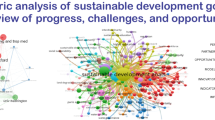Abstract
Water occupies a prominent role in global environmental change research as a result of its importance in the efficient functioning of the Earth System, and its role in socioeconomic development. Anthropogenic and natural factors have led to unparalleled changes in the global water system, necessitating integrative, interdisciplinary and holistic research paradigm for water resources management. A meta-analysis of water science projects shows that water research activities fall into HUMAN, ECOLOGY, PROCESS, and CLIMATE-BIOGEOCHEMISTRY clusters. Research themes within the clusters suggest that each research project set priorities along the lines of certain scientific disciplines. Statistical analysis further reveals low level of integration between the research clusters. The persistence of a disciplinary perspective could hinder science from effectively informing policy for sustainable water resources management. A proper integration of knowledge generated from different disciplinary epistemologies through partnership and collaboration of research projects is required for effective water management.
Similar content being viewed by others
References
Busing FMTA, Commandeuer JJF, Heiser WJ (2001) PROXSCAL: a multidimensional scaling program for individual differences scaling with constraints. Department of Data Theory, Leiden University, The Netherlands, p 10
Cosgrove W, Rijsberman F (2000) World water vision: making water everybody’s business. Earthscan, London
Cox TF, Cox MAA (2000) Multidimensional scaling, second edition monographs on statistics and applied probability, vol 88. University of Newcastle upon Tyne, UK, p 328
Framing Committee of the GWSP (2004) The global water system project: science framework and implementation activities. Available on line at http://www.gwsp.org/downloads/GWSP.gws-framework-20-05-04.pdf
Kabat P, Claussen M, Dirmeyer PA, Gash JHC, Bravo de Guenni L, Meybeck M, Pielke R Sr, Vцrцsmarty CJ, Hutjes RWA, Lutkemeier S (2004) Vegetation, water, humans and the climate – a new perspective on an interactive system. Springer, Berlin Heidelberg New York, pp 600
Kallis G, Kiparsky M, Milman A, Ray I (2006) Glossing over the complexity of water. Science 314:1387
Kruskal JB, Wish M (1978) Multidimensional scaling. Quantitative applications in the social sciences no 11. Sage, California, p 94
Olsson P, Folke C, Berkes F (2004) Adaptive co-management for building resilience in social-ecological systems. Environ Manage 34(1):75–90
Scientific Committee on Water Research (SCOWAR) (1998) Water resources research: trends and needs in 1997. Hydrol Sci 43:19–46
United Nations (2003) Water for people water for life. United Nations World Water Development Report UNESCO Publishing/Berghahn Books, p 576
van de Giesen N, Kunstmann H, Jung G, Liebe J, Andreini M, Vlek PLG (2002) The GLOWA Volta Project: integrated assessment of feedback mechanisms between climate, land use and hydrology. In: Beniston M (ed) Climatic change. Implications for the hydrological cycle and for water management. Advances in Global Change Research 10:151–170
Vörösmarty CJ, Green P, Salisbury J, Lammers R (2000) Global water resources: vulnerability from climate change and population growth. Science 289:284–288
Watson R, Buttimer A, Cropper A, Lang I, McBean J, Shamir U, Tickell C, Wandiga S (2003) Environment and its relation to sustainable development. Report of the CSPR Panel. International Council for Science (ICSU), pp 64
Author information
Authors and Affiliations
Corresponding author
Rights and permissions
About this article
Cite this article
Braimoh, A.K., Craswell, E.T. Quantitative Assessment of Interdisciplinarity in Water Science Programs. Water Resour Manage 22, 473–484 (2008). https://doi.org/10.1007/s11269-007-9173-0
Received:
Accepted:
Published:
Issue Date:
DOI: https://doi.org/10.1007/s11269-007-9173-0



